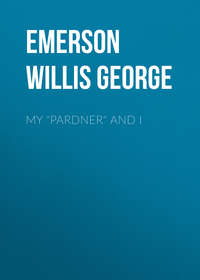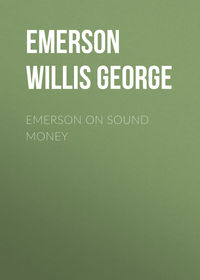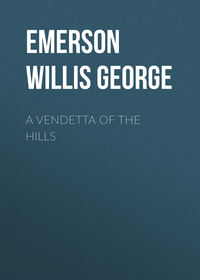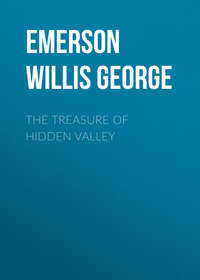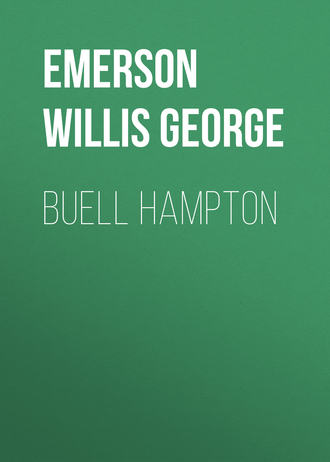 полная версия
полная версияBuell Hampton
“Purty danged good nerve, I can tell ye,” said Dan Spencer, “to foller them cussed cattle thieves like the major did. I’m thinkin’ I’d be purty hostill if I had to do it;” his tooth wobbled like the side motion of a fanning-mill.
“Don’t care if I do,” said Judge Lynn, greedily, as he reached over, and helped himself to a cigar.
“Why, certainly, gendemen,” said the major, and, eagerly rising, he passed around the box of cigars.
“Jist about the time o’ day I smoke,” said Dan Spencer, as he threw an enormous quid of tobacco toward the cuspidor. Bill Kinneman expectorated a sounding pit-tew of tobacco juice at the receptacle just as Judge Lynn threw a burnt match in the same direction.
“Waal, boys,” said Dan Spencer, when their cigars were going, “we’ve got toomultuous dooties to perform, an’ I guess we may as well move on. Jist drapped in fur a minit, yer know, Major.”
“That’s right, boys,” replied Major Hampton, shaking hands most cordially with them as they started away, “come often and be in no hurry about going, is the standing invitation you each have.” They all shook hands with Hugh, and soon after crept out along the veranda and down the steps into the street. When they were gone, the major said:
“They represent the masses. We cannot ignore them. Rightly guided, they are a power for good morals and good government; otherwise they are liable to menace the very foundations of our society.” Presently they heard some one singing.
“Hello!” said the major, “Marie has returned. Well, Stanton, let us quit the library and our cigars. By the way, I am a student of men, and I am surprised that you are not a musician, for you certainly have a soul full of it. I want you to hear my daughter sing. I fancy,” he continued, hesitatingly, “that she has a fairly good voice.”
They adjourned to an adjoining room. From a musician’s standpoint this room was a veritable dream. It was furnished with a “baby grand,” a complete musical library, containing some rare volumes; also with busts of Beethoven, Haydn, Bach, Handel, Mendelssohn, Chopin, Liszt, Schumann, Wagner, and other famous composers. On the walls were well-selected paintings, each in itself a study pertaining to music.
“This, Mr. Stanton,” said the major, “is my daughter’s studio. You are the first stranger ever invited into this room.”
“And who is her instructor, may I inquire?”
“I direct my daughter’s education in all her studies,” modestly replied the major.
“I am sure I feel highly honored,” returned Hugh.
Marie glanced innocently at him over her shoulder. She was standing before a music-case, with one foot slightly advanced, and as she turned to look at Hugh her gracefully poised figure seemed to him a perfect model.
“You are most welcome,” said the girl, smiling, “or we would not have asked you here.”
Hugh was wondering why he had been invited into the sacredness of this musical retreat, from which others were excluded, but his reverie was interrupted by the major’s seating himself at the piano. He struck a few chords on the keys, and, after running through several modulations, he glided into Mendelssohn’s Symphony in C Minor. The major’s great body swayed back and forth as the music moved him with its entrancing power. Someway, the spirit of the melody stirred Hugh in a manner strangely new.
The music suddenly ceased with a few jagged, broken notes, mixed together in a wailing discord, and the major turned sharply around toward their guest.
“Oh, papa,” cried Marie, “why did you do that?”
“All right, Stanton, my boy,” said the major, laughing, as he tossed his long, gray locks back from his forehead. “I see I am not mistaken; you have a soul filled with harmony, although you may not be able to play, as you say, even a jew’s-harp.”
Marie sang a selection from the “Bohemian Girl,” while her father played the accompaniment. Her rich, deep tones, silvery in their sweetness, vibrated and filled the room with a melody almost divine. She breathed into the song the fullness of her intensely musical soul. Her flutelike tones budded and then crescendoed into full-grown fragrant flowers, which gradually died away, like the falling petals – one by one – of an over-ripe rose. An impalpable sense of mystery and majesty seemed to envelop the singing girl to the now exalted and thrilled senses of Hugh Stanton. What subtle power was this that thrilled him through and through? It was unfathomable – he could not understand the genius of the invisible that swelled up about his exalted brain and filled him with a spirit not his own, while his soul throbbed in ecstatic delight. She ceased singing, and Hugh sank back into his chair, exhausted. The music had exhilarated him with new and wonderful thoughts – devout thoughts, divine ideas. The major turned from the piano, and discovered Hugh in the mysterious struggles that come to a traveler when his soul has been swept away on the surging deep of song.
Hugh soon took his leave of Major Hampton and his daughter, gratefully accepting their cordial invitations to call again at an early day. That night he dreamed of dwelling in some sacred and mystical retreat surrounded with music and poetry. Then the scene changed, and he saw a wide waste of desolate prairie stretching away in every direction. Presently Marie Hampton stood before him, weeping bitterly. Her fair cheeks and amethyst eyes were bathed in tears, while near her was Ethel Horton, speaking words of consolation. Between them was a mound of earth, and, looking closer, he saw it was a new-made grave.
CHAPTER XV. – THE RETRACTION
IN addition to the Patriot there were two other newspapers published at Meade. One of these, the Mascot, advocated Republican politics. The other was a mongrel sheet, promulgating uncertain political views. This publication left the press under the high-sounding name of the World.
The editor and proprietor of the World was a Mr. Frank Fewer. His enemies said the “fewer” the better of such unprincipled knaves. Politically, he favored the candidate who bought him last. The influence of his paper was a commodity for barter and sale.
On the day after Hugh’s visit at Major Hampton’s, the World made its weekly appearance, and contained in its columns the following article.
“HOME AGAIN.”“His Excellency, Maj. Buell Hampton, an old played-out politician, who edits a little five-by-nine sheet around the corner, known as the Patriot, has returned to the city. The editor of the World is not advised as to whether the old boodler has been away organizing a society of Farmers’ Alliance in some remote township, or a lodge of Barley Hullers. It is only a question of a short time until this illiterate decoy duck will slink from southwestern Kansas to pastures that are new.”
During the forenoon the major called at the bank and asked Hugh to accompany him to the World office.
“Certainly,” said Hugh, “I will go with pleasure.” Captain Osborn opened the door of his private office, and invited Major Hampton and Hugh into his room.
“Major,” said the captain, “why are you going down to the World office?”
“To kill the dog who penned and published this calumny,” replied the major, as he handed the captain a marked copy of the World.
The old captain laughed heartily and tried to infuse the major with a jovial spirit, but he would not be infused. His face was very white, and the lines about his mouth had a hard, set expression, like a tiger ready to spring. “I would n’t pay any attention to it at all,” said the captain, soothingly.
“Fewer’s blood, sir,” hissed the major, “alone can blot out this contemptible insult. He has defamed my character, and, by the Eternal, he shall pay the price.”
“Hold on, Major,” said Captain Osborn, “I am your friend in this matter, and I cannot permit you to make a mistake. Suppose now that we force the World to run off another edition containing an ‘amende honorable,’ or something of that sort – what then?”
“I do not believe,” said the major, reflectively, “that he will do it; but if he will, and bring out the issue to-day – a full issue, mind – I will then let him off with a horsewhipping.”
“Well, now, that’s better,” said the captain, shaking hands with him, as if the affair were settled. “You stay right here, Major, until I come back.”
When Captain Osborn arrived at the World office, he found Frank Fewer, Esq., seated in a rickety old chair, engaged in wrapping bundles of papers preparatory to sending them away.
“Good morning, Captain,” said Fewer, while an idiotic grin covered his face.
“Good morning,” returned the captain, “have n’t sent away this week’s papers yet, have you?”
“No,” replied Fewer, “only a few around town; but why?”
The iron will of the old captain arose to the emergency. “Fewer,” said he, “but for my friendly interference in your behalf, you would now be a dead man.”
“What!” shrieked the editor.
“A dead man, I say!” reaffirmed the captain, in a quiet, determined voice. “Here,” said he, opening a paper, “this libelous article – why did you print such a contemptible thing?”
Fewer was at heart a groveling coward. He whined and begged, and protested that Lem Webb, a misanthropic lawyer, had written the article, and that he, Webb, had agreed to pay him five dollars for its publication.
“It will cost you your life, sir,” said the captain, with a stern military ring in his voice. “There is but one way to avert the calamity in which your corpse must necessarily figure as the principal attraction.”
“How, Captain? For God’s sake tell me,” begged the now trembling editor.
The captain explained the conditions. “Suppress all of the present issue possible, run off another issue of the paper, containing an amende honorable, and take a horsewhipping. Otherwise, death.”
The terms were agreed upon instantly, and the captain hurried back to inform the major of the “unconditional surrender,” and to prepare a copy of an amende honorable, while the frightened editor commenced making preparations for a special edition.
That afternoon the World again made its appearance, and contained the following retraction:
“AMENDE HONORABLE.”“At the solicitation of Lem. Webb, Esq., and on account of a promise of five dollars, I maliciously and wilfully permitted a libelous and untruthful item to appear in the columns of the World this morning, derogatory to the character of Mai. Buell Hampton.
“This open letter is a public acknowledgment on the part of the editor of the World that he knew the item in question to be a malicious lie, at the time it was published, and he hereby publicly apologizes to Major Hampton. The editor further desires to state that he personally knows Major Hampton to be a cultured gentleman of unquestionable moral character, – a man whose high sense of honor and integrity is above reproach. Respectfully,
“Frank Fewer,“Editor of the World.”That evening Bill Kinneman and Dan Spencer waited upon Editor Fewer at his home.
“Hello! gentlemen,” said Fewer as he came down the walk in front of his house to meet his callers.
“Hello! yourself,” replied Dan Spencer. “We only called jist fur a minit. We’s in a pow’rful big hurry. We’ve got Major Hampton’s proxy to hosswhup ye.”
“Oh, come, gentlemen,” whined Fewer, “after the retraction I published, the major can’t really mean to subject me to so great a humiliation.”
“I reckon that’s about the size of it,” said Spencer, trembling with a wrath that made his fang-like tooth wobble from one side to the other as if it were trying to dodge a calamity. “We’re not a-bustin’ with perliteness,” said Spencer, “in projectin’ ‘round over the range this ‘ere way, I suppose, but I’m assoomin’ dooty is dooty an’ jestice knows no fav’rites.”
Frank Fewer turned, and fled with all the speed that he could command. Bill Kinneman sprang into his saddle and, touching spurs to his horse, galloped madly after him. The cowboy loosened his lariat as he rode, and swung the coil dexterously over his head several times. Then, with a quick, powerful twitch, the rope shot out like an arrow after the sprinting editor. The loop fell over his head and shoulders, then tightened, binding his arms to his sides. A few minutes later Frank Fewer was a horsewhipped editor.
Smarting with pain and humiliation, Fewer called on Attorney Webb, determined to bring suit for the outrage perpetrated upon him. The lawyer was just reading the amende honorable article, in which he discovered that Fewer had sacrificed him most shamefully, in attempting to save himself. A little later the editor picked himself up from the sidewalk, a badly thrashed and a thoroughly kicked man. Thereafter the World was known as a journal that attended strictly to its own business.
CHAPTER XVI. – THE OLD VIOLIN
HUGH called at the Patriot office to congratulate the major on Fewer’s retraction. He found him in his den dictating an editorial to his daughter. Hugh was made welcome, not only by the major’s words, but also by Marie’s smile.
“You see that my daughter is my amanuensis,” said the major. “She has mastered the pothooks of shorthand so thoroughly that she is able to report the speeches of our public men, although some of them are very rapid talkers. In addition to this she is the ‘typo’ of the Patriot. She has worked in the printing-office for four years, and during the last year has read and corrected her own proof. I maintain that an experience in a country printing-office is a liberal education in itself.”
Hugh was very much surprised to find that one so young as Marie possessed so much practical knowledge. These accomplishments, added to her rare musical talents, increased the interest that he was beginning to feel in her.
Marie soon returned to her type-setting case in the back room, and the major, taking up some copy that was lying on the table, said, “We are enjoying good times in southwestern Kansas, but the metropolitan dailies of our larger cities constantly remind us that something is wrong in our economic system. While one class surfeits itself with feasting, another class in the same locality is starving. Has it ever struck you, Mr. Stanton, that something is radically wrong and unfair in the distribution of wealth?”
“Really, Major,” replied Hugh, “I am not sufficiently versed in political economy to discuss the subject intelligently. I believe that there is an improvident class of laborers in this country, who, when out of employment, are immediately out of money – a people who signally fail in the obligations that they owe to the general government and to themselves.”
“The obligations of the government and of its citizens,” said the major, warmly, “are mutual. A government that demands defense from its citizens in the hour of peril, and fails to provide work for them in the time of peace, is cowardly and lame in solving the simplest elementary problems of human existence and comfort.”
“But is there so much want and misery abroad in the land?” asked Hugh. “Thanksgiving proclamations from the various States disclose the fact that prosperity and plenty abound. I fear, Major, that you are pessimistic on this subject.”
“My dear Stanton,” replied the major, earnestly, “a Thanksgiving proclamation, nine times out of ten, is a burlesque on our civilization. If the same amount of energy were expended in encouraging enterprises that increase the riches and happiness of communities, as is put forth in enacting laws that encourage and protect individual riches, much more good would result. A selfish law begets and encourages selfishness, and smothers every altruistic virtue. The result is, that robbery and jobbery are alike legalized; not by the consent of the governed, but by bribed legislatures. The rich grow richer, and, under the legal protection of bristling bayonets, they enforce oppressive and unjust laws; while the poor continually grow poorer and more miserable. I cannot blame the masses for not tolerating the licentious luxury of the rich. All just laws derive their legitimate power from the consent of the governed.”
“Would you not consider, Major, that he would indeed be a bold man who would take issue with Ruskin on this subject?” asked Hugh.
“He might be rather a very foolish man,” replied the major. “What does Ruskin say?”
“He says,” replied Hugh, “that none but the dissolute among the poor look upon the rich as their natural enemies, or desire to pillage their homes and divide their property. None but the dissolute among the rich speak in opprobrious terms of the vices and follies of the poor.”
“That’s all right, Stanton,” said the major, but there was an irritable ring in his voice, as he arose and walked back and forth with his hands clasped behind his back. “That’s all right,” he repeated; “the trouble is, however, that too many of the rich are dissolute.”
“How about the poor?” asked Hugh. “Is n’t there a considerable number of them who would like to divide up property?”
“Hold on, Stanton,” said the major; “stop right there. You and I must not talk politics. My convictions are so strong that I find myself irritated by your words. I am beginning to feel ugly toward you.”
“Questions of social or political reform, at best, are usually unsatisfactory,” replied Hugh, “and I quite agree with you that nothing can be gained by heated discussions.”
The major made no reply, but soon afterward, at his request, they walked down the street toward his home. On reaching the privacy of the library, the major turned to Hugh and said, “Stanton, I have something to say to you. I feel like taking you into my confidence more than I have ever done, and still – well, I don’t know, – some other time, perhaps, might be better.” Hugh observed an earnestness in the words of the major, and in the expression of his face, that he had never noticed before. There was a soft intonation in his musical Southern voice that was most convincing. This, together with his dignity and refinement of manners, elevated him in Hugh’s eyes almost to the height of sublimity. He turned away from Hugh in apparent half indecision, and went into another room; but soon returned with a violin.
“What, are you master of all musical instruments?” asked Hugh, looking up in pleased surprise.
“Master is a strong word,” replied the major, as he gently tuned the aged Stradivarius, and softly thumbed the strings. Then, tenderly embracing the violin with his chin, as he placed it in position, he brought his bow at right angles, and Schumann’s “Trbumerei” trembled from the strings in soft and plaintive melody, filling every corner of the room with echoing and reechoing notes of sweetness. Other airs followed one after another in quick succession, and, as he played, the pleading tones seemed to grow richer and deeper in their harmonic cadences.
The gathering twilight deepened into night, but still the major went on caressing and winning from the violin selections and improvisations that would have charmed the most cultured ear. Sometimes the strings would cry out like the pleading wail of a lost soul, and float away through the window, charging the night wind with quivering melody. Again the notes seemed glints of moonbeams falling aslant through the gloaming, and lighting up the face of the old man as if with a halo of glory. Then the music changed, and it seemed no longer to be the work of mortal hands, but, rather, the soulful touch of some rare and heavenly spirit that was sweeping over the strings with sublime inspiration – with divine outpourings of a soul.
The elevation running through the harmony was devoutly exalting. The notes were brought together in full, rich strength, deftly caught back again, then bursting forth like a raging storm on the boundless ocean. Presently a single note rang out like a warning of danger. It was a wild, surging tone, and cried piteously, as if pierced and torn. Then the music ceased, and the silence of night throbbed with countless echoing notes that floated away on the invisible air. Tears were in the strings of the old violin, in the trembling zephyrs that were wafted in at the open window, and in Hugh Stanton’s eyes. It was music never again to be heard, yet never to be forgotten.
CHAPTER XVII. – LENOX AVONDALE’. ARRIVAL
AS the weeks wore into months, Hugh Stanton saw a great deal of the Hortons. The cattle king seemed drawn to Hugh by some strange attachment which he could not explain. Even Mrs. Horton began to feel a sense of security about Hugh’s presence at their home that she could not have believed possible a few months before. Perhaps she relied on Mrs. Osborn’s assurance that she would be responsible for Mr. Stanton’s non-interference with their plans for Ethel.
Hugh had been thrown much in Ethel’s society, and his admiration and platonic regard for the girl had strengthened at each succeeding meeting. He fancied that he noticed a shade of sadness on Ethel’s face, and once or twice he was sure that he discovered traces of tears. They frequently went horseback riding together down the valley, and he found her to be an expert equestrienne.
It was a bright autumnal day, and Hugh and Ethel were returning to the Horton home after a long ride. She had been telling him of Lake Geneva; and he confessed that, notwithstanding his long residence in Chicago, he had never visited that beautiful resort. Once Ethel was tempted to ask him if he were acquainted with Doctor Redfield, but her letter had never been answered, and she refrained from doing so. She had not given up hope, however; but lived on from day to day in the belief that, sooner or later, the man to whom she had completely given her heart would come and claim her.
On entering the house, Ethel uttered an exclamation of surprise, as she went forward to welcome a stranger whom her mother was entertaining. Then, turning, she introduced Dr. Lenox Avondale to Hugh. The Englishman bowed indifferently to Stanton, and turned again to Mrs. Horton to finish some remark he had been making. There was a supercilious air about the man which Hugh instinctively disliked.
As Hugh took his departure, Ethel followed him to the veranda and insisted that they must have their ride together the next afternoon. Hugh believed her solicitude to be an effort to make amends for the haughty indifference of the Englishman.
“Miss Ethel,” said he, “I surrender unconditionally. No, I’ll not say that – it is with this condition; if you are sure that you want me, let me know; but I fancy your time will be entirely taken up during the stay of your English friend.”
As Hugh rode thoughtfully homeward, he saw a carriage coming toward him. It was Mrs. Osborn driving over to the Grove. At her salutation he dismounted and stood beside the carriage.
“Did you meet Doctor Avondale?” she asked, with an air of triumph playing about her pretty face.
“I had that honor,” replied Hugh.
Then followed some light conversation, in which Mrs. Osborn tried to be most captivating in her quick repartee.
“Are you sure, quite sure, you do not want to ask me a single question?” she interrogated.
“Well, I should like to know how long the Englishman is going to remain?” said Hugh, hesitatingly.
Mrs. Osborn broke into a silvery laugh, as she replied, “What difference can it make to you? Your regard for Miss Ethel is only of a platonic nature, don’t you know?”
“That is very true,” replied Hugh, “I have not changed my mind a particle; nevertheless, a platonic regard may be strong enough to cause one to take a deep interest in one’s friends.”
“You are quite clever to put it that way,” said Mrs. Osborn. “I shall try to ascertain, and will let you know just how long Doctor Avondale expects to remain, although you are such a naughty boy I ought not to favor you a particle.”
“What have I done?” asked Hugh.
“Oh, you neglect your friends so, – unless, perchance, it is your platonic friend, Miss Ethel,” she said, looking archly at him. “I was telling the captain only the other day that we invited you at least a dozen times to our house for every one time you honored it with your presence.”
“One does not like to wear out one’s welcome,” replied Hugh, evasively, “however, I shall be delighted to call to-morrow evening if agreeable.”
“Very well,” said Mrs. Osborn. “No,” said she, after a moment’s hesitation, “come to dinner this evening. I think, perhaps, I shall entertain Doctor Avondale to-morrow evening.”


